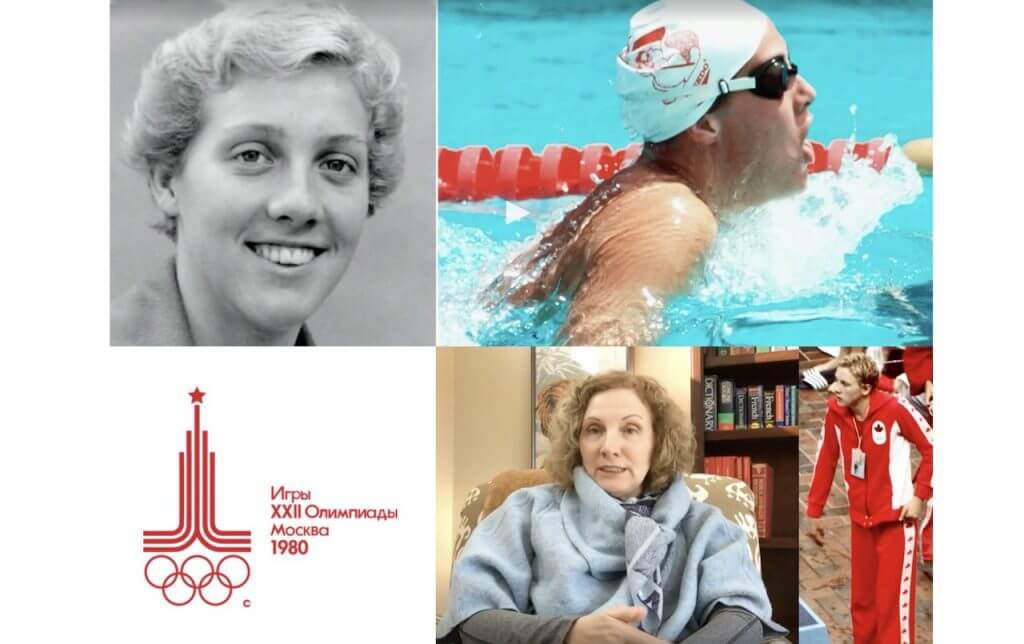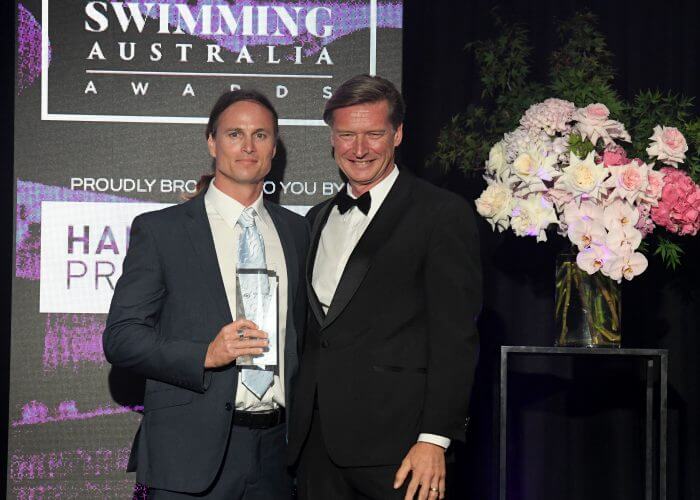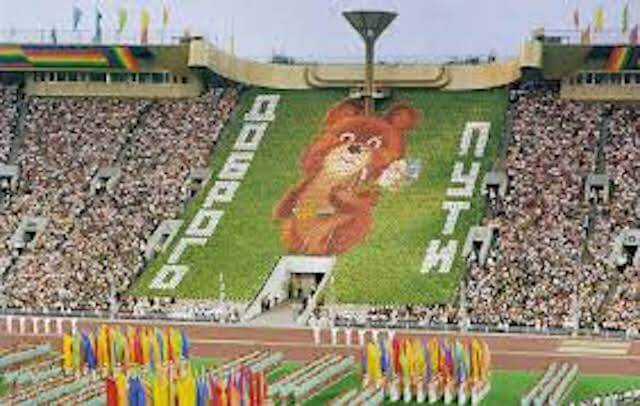Memories of Moscow 1980 – 40 Years Since Boycott Buried The Chances Of Cheryl Gibson & Maple Mates

Today marks the 40th anniversary of the first day of racing in the pool at the 1980 Olympic Games in Moscow but not all medal hopes, such as Canada’s Cheryl Gibson, made it: a boycott led by United States President Jimmy Carter in the wake of a Soviet invasion of Afghanistan in December 1979, spread to other nations, including American’s northerly neighbour. This week, Swimming World is looking back at the events of 1980 and their impact on those who missed out and what the Moscow Games meant for those who made it, even, in some cases, when their Governments did not endorse their participation but their nations did.
Our coverage so far:
- Moscow Olympic Flagbearers Max Metzker And Denise Boyd Linked Forever In Australia’s Proud Olympic History
- USOPC CEO Sarah Hirshland to 1980 Olympic Team: ‘You Deserved Better’
- The Moscow Boycott: A Toxic Mix of Sports and Politics Proved Costly for Hard-Working Athletes
In COVID-19 Season 2020, many swimmers around the world are having to adapt to a sports calendar redrawn by the pandemic, forcing goals to be reset and preparations to be adjusted. The sinking feeling caused by postponement and cancellation is nothing new to the swimmer: go back 40 years and we find Edmonton’s Cheryl Gibson and Canadian teammates among those who had worked for four years and more to live an Olympic dream only to find it taken from them by events beyond their control.
Gibson has more reason than most to feel robbed by her Olympic experience. In 1976, she raced at a home Games in Montreal. The official historic record shows – and probably always will unless athletes step up to make a change – that Gibson took silver in the 400m medley at Montreal 1976. What that record does not reflect is that she would, most likely, have been Olympic champion of the long medley and one of three Canadians who may have celebrated a home-Games sweep in the 100m backstroke with Nancy Garapick and Wendy Cook had it not been for systematic doping of teenage girls in the German Democratic Republic (GDR).
Four years on, via the Commonwealth 200m backstroke title and bronze medals over 100m backstroke and 400m medley at Edmonton in 1978, then three silvers at the 1979 Pan Pacific Championships, Gibson was set for Olympic trials.
In May, at the height of lockdown and pool closures in Canada, Gibson reflected on the moment in an interview with Global News, saying:
“By the time we got to our trials, we knew we weren’t going. It’s a big letdown afterwards, you do all that training.”
Addressing the current generation, she notes, “They’re gonna have to show some real resilience … those will be the people who are successful.”
Thinking of others first helps. In recalling the events of 1980, Gibson said she was hit less hard because she already had success at a Games under her belt. She told Global News:
“I was reading a newspaper and it was talking about how the Russians had entered Afghanistan and I thought right then ‘that’s probably not good’. It might sound funny but I already had an Olympic medal and I think I dealt with it by focusing on my friends who… this was going to be their only chance and I felt really bad for them. So, I didn’t have a lot of time to feel sorry for myself.”
No April’s Fool For Cheryl Gibson & Co But Canadian Swimmers Held Their Own 1980 Olympics
It was April 22, 1980 when Canadian Olympic hopefuls found out that Canada would be joining a U.S.-led boycott of the 1980 Games in Moscow.
“Without any doubt at all, we won’t be going to Moscow,” swimming coach Tom Johnson told Cheryl Gibson and teammates gathered in a Vancouver pool.
The swimmers were told 10 minutes before the news hit the headlines.
CBC was among the first to gain access to the athletes for comment. Then 20 years old, Cheryl Gibson told the network that the swimmers were hugely disappointed but resigned to their fate
“I guess we had to make a decision whether we were going to stand behind the Russians or the Americans. And it had to be the Americans.”
As Moscow unfolded this week 40 years ago, Canada’s swim team staged its own Olympic celebration at the Etobicoke Olympium. A five-day Esso Cup, a combination of the Canadian national championships and Olympic trials, resulted in 13 women and 17 men being named to Canada’s honorary Olympic team. The thirty who made the squad partied at a banquet in the Olympium’s gymnasium on the day some of those they might have raced against in Moscow were preparing for the Opening of the 22nd Games.
The team included a young Alex Baumann, who would go on to become double Olympic medley champion at Los Angeles 1984 and is now head of performance at Swimming Australia. Here are the names of the achievers denied their Olympic moment in 1980.

Alex Baumann in 2019 (right) with Australia coach of the year Dean Boxall – Photo Courtesy:
The Canada Swim Team For the 1980 Olympic Games:
Women’s team –
- Wendy Quirk, Edmonton
- Deb Armstead, Calgary
- Jenny Boulianne, Pointe Claire, Que.
- Leslie Brafield, Etobicoke
- Nancy Garapick, Halifax
- Cheryl Gibson, Etobicoke
- Anne Jardin, Pointe Claire
- Paula Kelly, St. John’s, Nfld.
- Carol Klimpel, Scarborough
- Naomi Marubashi, Scarborough
- Kathy Richardson, Toronto
- Denise Senechal, Montreal
- Megan Watson, Edmonton.
Men’s team –
- Peter Szmidt, Edmonton
- Kevin Auger, Guelph, Ont.
- Alex Baumann, Sudbury, Ont.
- Rob Baylis, Vancouver
- Bruce Berger, New Westminster, B.C.
- Claus Bredschneider, Etobicoke
- Dennis Corcoran, Hamilton
- Wade Flemons, Vancouver
- Eugene Gyorfi, New Westminster
- Cam Henning, Edmonton
- George Nagy, Edmonton
- Mike Olson, Etobicoke
- Steve Pickell, Etobicoke
- Bill Sawchuk, Thunder Bay, Ont.
- Graham Smith, Thunder Bay
- Dan Thompson, Etobcoke
- Graham Welbourn, Vancouver.
Then coach of the Olympic women’s team for 1980 and Canada’s head coach at the 1972 and 1976 Games, Deryk Snelling told CBC:
“I would think that a lot of the swimmers are disappointed because they aren’t in the Olympics. But their pride will be satisfied. If not for the naming of an Olympic team despite the boycott, a lot of the swimmers would have quit swimming this summer. We are being used as political pawns and nothing else, and it’s very tough on the athletes. For the amateur athlete, it’s the honour of making the Olympic team that counts.”
At the Etobicoke Olympium and an alternative Olympics, Canadians set one world record, five Commonwealth and seven Canadian records. The global standard was established by Peter Szmidt: 3:50.49. Just 18 at the time, Szmidt also wiped 12 seconds off his own Canadian 1500m freestyle record for a 15:28.88 best.
In Moscow, Vladimir Salnikov, of the USSR, made history with the first sub-15minutes 1500m free and also claimed gold in the 400m, his 3:51.31 down on Szmidt’s new mark, which would survive as the World record until Salnikov clocked the fourth of his five 400m global standards on March 12, 1982. Four years after missing out through Moscow boycott, Szmidt made it to the Los Angeles 1984 Games boycotted by the Soviet bloc. There was no Salnikov to contend with but by 1984, Szmidt was not in the same shape as he had been in 1980 and was eliminated in the third heat of the 400m well down on best.
There were many examples of fine swims that placed Canadians in with a shot at the Olympic podium in 1980, among them Dan Thompson‘s 55.38 in the 100m butterfly for ‘virtual’ selection to the Canadian team at the Etobicoke Olympium. The Olympic crown was won in 54.92 by Sweden’s Pär Arvidsson in Moscow.
A tour of Hawaii and Japan was planned for the Canadian swim team and part of efforts to keep motivation and the dream alive and capitalise on the hard work that had been put into making a Moscow Olympics that was not to be – at least not for them.

Cheryl Gibson – Photo Courtesy: screenshot Global News
Cheryl Gibson said that while she was honoured to have been named for the 1980 squad, she would probably bypass the tour and take her first summer break in five years. A member of Etobicoke Swim Club, she told CBC:
“Making the Olympic team still means something even though we aren’t going to the Olympics. But swimming in Hawaii and Japan next month can’t be a replacement for the Olympics. I haven’t had a summer off in five years, so I may just take the rest of the summer off after this week.”
What it would actually come to mean was this: Cheryl Gibson did compete again but not for long. She never stood on another international podium and her career ended in her early 20s at a time when that matched the definition of longevity in careers in a sport without financial reward or support (none was allowed under amateur rules).
The Canadian Olympic team of 1980 raced that summer of 1980 against the West Germany squad that was also forced to miss the Moscow Games. She was joined by Etobicoke teammate Thompson, Graham Smith of Thunder Bay, Ontario, and Szmidt, of the Edmonton Keyano Swim Club, among those who opted to take a summer off after their selection to a Games that, for them, would not be. A member of the Canadian medley quartet that took silver at a home Olympics in Montreal in 1976, Smith would claim two Universiade titles in 1977 and the 200m medley World title and silver over 100m breaststroke at Berlin 1978 (in a time just 0.16sec away from what it would take to claim Olympic gold at Moscow two years later). In 1978, topped the bill at the Commonwealth Games in Edmonton, where he won a then record six gold medals.
“Wounded Olympics”

Moscow 1980 Opening – Photo Courtesy: – NT Archive
Norman Webster of The Globe and Mail in Canada wrote this day 40 years ago: “The wounded Olympics of 1980 have begun a two-week run for respectability here. Only a series of brilliant performances can salvage things.”
“The Soviet invasion of Afghanistan has made these the most controversial Games since Berlin in 1936. The U.S.-led boycott has taken away the sparkle of sport at its best and will mean medals going to also- rans in many events.
“The divisions of the world were dramatically on show to 100,000 spectators in Lenin Stadium on Saturday at the opening ceremonies. Name plaques from just 80 countries were carried around the track, and 16 of them insisted on flying the Olympic flag, refusing to parade their national colors past Soviet President Leonid Brezhnev, who officially opened the Games.
“Seven of these teams sent no representatives at all to the ceremonies, and Olympic flags were carried for them by Soviet soldiers in red shirts and curious pink baseball caps.
“It was the lowest Olympic turnout since Melbourne in 1956, when 67 countries took part. Numbers had risen steadily to 122 at Munich in 1972, then dropped back to 88 in Montreal in 1976 because of the boycott by African and Caribbean countries.
“Currently, the International Olympic Committee recognizes national Olympic committees in 149 countries, which means 69 are not on hand in Moscow. Many of these are not boycotting the Games, but are simply small nations with no world-class athletes and would not have come anyway.
“The boycott has hit hard, however. The absence of such major sporting nations as the United States, West Germany, Japan, Kenya and Canada will leave huge gaps in the glamor sports of the Games – track and field, swimming, gymnastics and boxing.”
And so it did.
Webster noted that the Opening Ceremony “was not reminiscent of the ugliness of Berlin 1936, when the stadium was awash with swastikas and Adolf Hitler’s followers chanted ”Sieg Heil” to the Fuehrer.
“The Soviets played things very straight. The Olympic slogan Citius, Altius, Fortius (faster, higher, stronger) was the only one on view, and the only flags flying were Olympic ones.”
If there was one striking moment in the ceremony, which lasted three hours and 20 minutes, it was the sight of Stephan Prefontaine and Sandra Henderson, young Canadians, jointly delivering the Olympic torch to the Lenin Olympic Stadium at the end of its journey from Montreal, the 1976 host.
James Worrall, Canada’s representative on the International Olympic Committee (IOC) attended the top-table’s meeting on the eve of the Games but left Moscow before the opening ceremony, his nation having insisted that Canada would not be represented at the Games.
Athletes from some nations, Britain and Australia among them, insisted own going, despite political pressure for them not to do so. At the Opening in Moscow, some Australian athletes, parading behind the Olympic flag, waved tiny Australian flags they had acquired from tourists when they passed Soviet President Leonid Brezhnev.
In this era of growing Athletes Representation, it is worth noting that they did not see their act as political, just simple something that reflected their right to an identity and a nationality. Even so, they copped it (got in trouble from) Australian officials who, Webster noted in 1980 “had to resist fierce pressure from the Australian Government to make it here”.



